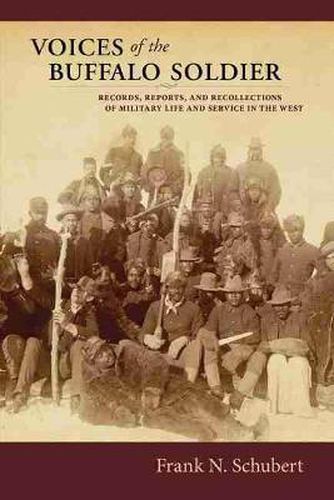Readings Newsletter
Become a Readings Member to make your shopping experience even easier.
Sign in or sign up for free!
You’re not far away from qualifying for FREE standard shipping within Australia
You’ve qualified for FREE standard shipping within Australia
The cart is loading…






The Buffalo Soldiers were African Americans who served in the Regular Army between the Civil War and World War I and fought in some of the most difficult wars against western Indians. Examining their military service, their social lives, and their interactions with western civilian communities, it uses the words of the soldiers themselves and of contemporary observers, some friendly and some not.
Voices of the Buffalo Soldier draws on a wide variety of periodicals, military records, and letters. It covers such key topics as the legislative origin of the inclusion of black soldiers in the army, the campaigns in which the Buffalo Soldiers fought, their daily lives and interactions with white communities, the few black chaplains and line officers who were permitted to serve, and the bravery of some Buffalo Soldier heroes. All students of the frontier army as well as aficionados with a special interest in the Buffalo Soldiers will find this an invaluable publication.
The first work that presents the correspondence and their primary documents pertaining to black soldiers’ lives in the West.–Quintard Taylor, University of Washington
$9.00 standard shipping within Australia
FREE standard shipping within Australia for orders over $100.00
Express & International shipping calculated at checkout
The Buffalo Soldiers were African Americans who served in the Regular Army between the Civil War and World War I and fought in some of the most difficult wars against western Indians. Examining their military service, their social lives, and their interactions with western civilian communities, it uses the words of the soldiers themselves and of contemporary observers, some friendly and some not.
Voices of the Buffalo Soldier draws on a wide variety of periodicals, military records, and letters. It covers such key topics as the legislative origin of the inclusion of black soldiers in the army, the campaigns in which the Buffalo Soldiers fought, their daily lives and interactions with white communities, the few black chaplains and line officers who were permitted to serve, and the bravery of some Buffalo Soldier heroes. All students of the frontier army as well as aficionados with a special interest in the Buffalo Soldiers will find this an invaluable publication.
The first work that presents the correspondence and their primary documents pertaining to black soldiers’ lives in the West.–Quintard Taylor, University of Washington